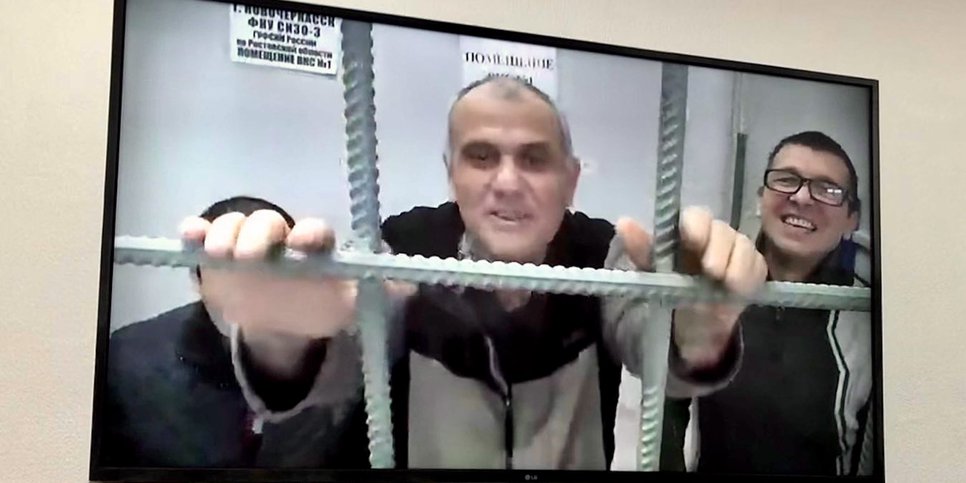Three Jehovah’s Witnesses during an appeal hearing in the Rostov Regional Court. In the center of Vilen Avanesov. December 6, 2021
Three Jehovah’s Witnesses during an appeal hearing in the Rostov Regional Court. In the center of Vilen Avanesov. December 6, 2021
Rostov Regional Court Approved Six to Six and Half Years in Prison for Three of Jehovah's Witnesses. They Have Already Served Half of Their Sentence in Pre-Trial Detention
Rostov RegionOn December 6, 2021 the Rostov Regional Court examined the appeal of 69-year-old Vilen Avanessov and his son, Arsen, as well as 54-year-old Aleksandr Parkov. They are all residents of Rostov-on-Don. The panel of judges headed by Gennadiy Peschanov left the sentence of the first instance unchanged: Parkov and Arsen Avanesov were sentenced to 6.5 years of real imprisonment and Vilen Avanesov - to 6.
The verdict came into force. The men insist on their complete innocence. They have the right to appeal the decision in cassation and international instances.
In July 2021, the prosecutor requested 7 to 7.5 years in a general regime penal colony for the believers. Vladimir Khudaverdyan, a judge of the Leninskiy District Court, found the law-abiding citizens to be extremists, but slightly commuted the sentence. The believers have de-jure served more than half of their sentence, as they were in the pre-trial detention center for 2.5 years while the investigation and the trial were going on.
In the late 1980s, the Avanessovs were forced to flee to Russia because of the war in Nagorno-Karabakh. However, there they suffered repressions because of their faith.
Arsen is worried about his retired parents who have poor state of health. In addition, his mother was left alone without proper support. The investigating authorities did not allow her to see either her husband or her son for more than a year. Aleksandr Parkov had immune system problems. His wife Galina, who in January 2021, was also found guilty under the "extremist" article, is very worried about her husband's health: "The conditions in the detention center are not good, he often had stomach aches."
On May 22, 2019, officials of the Investigative Committee of Russia conducted mass searches in the homes of Rostov residents suspected of practicing the faith of Jehovah's Witnesses. On the same day, a criminal case was opened against Parkov, as well as father and son Avanesov for their religious beliefs alone. Immediately after the searches, the men were taken into pre-trial detention.
The charges against the believers were based on numerous falsifications. For example, at one hearing the court questioned a secret witness who had been instructed by the FSB to provoke Jehovah's Witnesses to criticize various denominations and the state. Two other witnesses claimed that their testimony was distorted. According to one of them, during the interrogation a whole paragraph of someone else's statements was attributed to her.
The believers repeatedly drew the court's attention to the fact that the religious meetings of Jehovah's Witnesses are not extremist activities, but a peaceful manifestation of faith. They also emphasized the peacefulness of their beliefs. "In their relations both with the authorities and with other people, Jehovah's Witnesses try to be correct, not to respond to rudeness, but to take the example of the first Christians and Jesus Christ," said Arsen Avanesov at one of the court hearings.
Earlier, convictions of six other Jehovah's Witnesses were confirmed in Rostov-on-Don because of their belief in God. They all received two to four years of suspended sentences.
The Plenum of the Supreme Court of the Russian Federation on 28 October, 2021, brought attention to the inadmissibility of prosecuting Jehovah's Witnesses for their participation in peaceful meetings. According to its ruling, worship of Jehovah's Witnesses and their joint rites and ceremonies do not by themselves constitute a crime under the Article 282.2 of the RF Criminal Code, despite the liquidation and prohibition of their legal entities.



